The healthtech sector received $2.2 Bn funding across 131 deals in 2021
There were 3,548 active startups in the healthtech space in 2021, accounting for 8.9% of the startup world that comprises 39,960 companies
Online pharmacy cornered $726 Mn, or 33%, of the total funding the healthtech sector attracted in 2021
The healthcare infrastructure is woefully inadequate in India. The Covid-19 pandemic brutally exposed the miserable conditions. As the second wave hit in March last year, the infrastructure, whatever minimal it was, collapsed in no time. All the available healthcare facilities were swamped with patients. Hospitals ran out of beds. ICUs were crammed. Even make-shift hospitals could not take the load. Ventilators were far and few between. Oxymeter was scantily available. Ambulance services were inaccessible even in cities. Even paracetamol was scarce. That a large number of Covid patients died at hospital gates without getting oxygen support tells a tale.
Startups in the healthtech space gained prominence in 2021 as they aimed to fill the yawning gap in this sector and bring in innovations. Online pharmacy, for instance, caught the attention of consumers as well as investors. With health consciousness improving in the aftermath of Covid-19, fitness and wellness startups too hogged the limelight last year. Healthcare at home service, etc. is another segment that found many takers.
Artificial intelligence has opened an entirely new vista. Its use is being explored across the spectrum – from diagnosis and treatment to drug discovery and clinical trials.
Explore Inc42's 2021 In Review
Potential Of Healthtech Sector Vis-à-Vis Fund Inflows
With the digital economy attracting global and domestic investors, the Indian startup ecosystem closed the year 2021 with $42 Bn inflows. Healthtech was one sector that got a big push even as the Covid scare cast a shadow throughout the year. The startups in this sector received $2.2 Bn in funding across 131 deals, Inc42 data shows. For the huge potential it has, the healthtech space minted four unicorns in 2021, announcing the sector’s coming of age.
It is a different story that ecommerce (10.6 Bn), fintech ($8 Bn), edtech ($4.7 Bn) outshone healthtech in terms of funding. According to Arun Natarajan, Founder, Venture Intelligence, healthtech is considered a safe bet but returns to investors are not as high as is in the case of fintech and ecommerce sectors. This explains low funding in healthtech startups compared with ecommerce or fintech.

Distressed Healthcare Sector
The ills plaguing the healthcare sector are many. Abysmally low government spending on healthcare, poor doctor-patient ratio, ill-equipped hospitals, insufficient number of labs and diagnostic facilities, lack of access to hospitals, absence of medical records of patients…. the list is long.
The public spending on healthcare, as a percentage of GDP, was a mere 1.2% before finance minister Nirmala Sitharaman effected a huge increase in the budget last year.
There is less than one doctor (0.82) per 1,000 people where the World Health Organization recommends at least one doctor per 1,000 people. The picture of healthcare workers, including nurses, is equally appalling.
Astute investors see good opportunities in this under-developed market. Look at this projection: the healthtech market in India is estimated to grow at 27% CAGR to $21.3 Bn by 2025 and enjoy a share of over 3% of the global market.
But the funding is perhaps not in tune with the potential it has. According to Inc42 analysis, since 2014, the healthtech sector has attracted a total of $4.7 Bn. A closer look at healthtech startup funding trends since 2014, however, points to an uneven pattern. Though funding saw a rise in 2015, 2017, 2018 and 2019, it slipped in 2016 and surprisingly in 2020. In the pandemic year of 2020, healthtech startup funding declined to $456 Mn from $546 Mn in 2019.
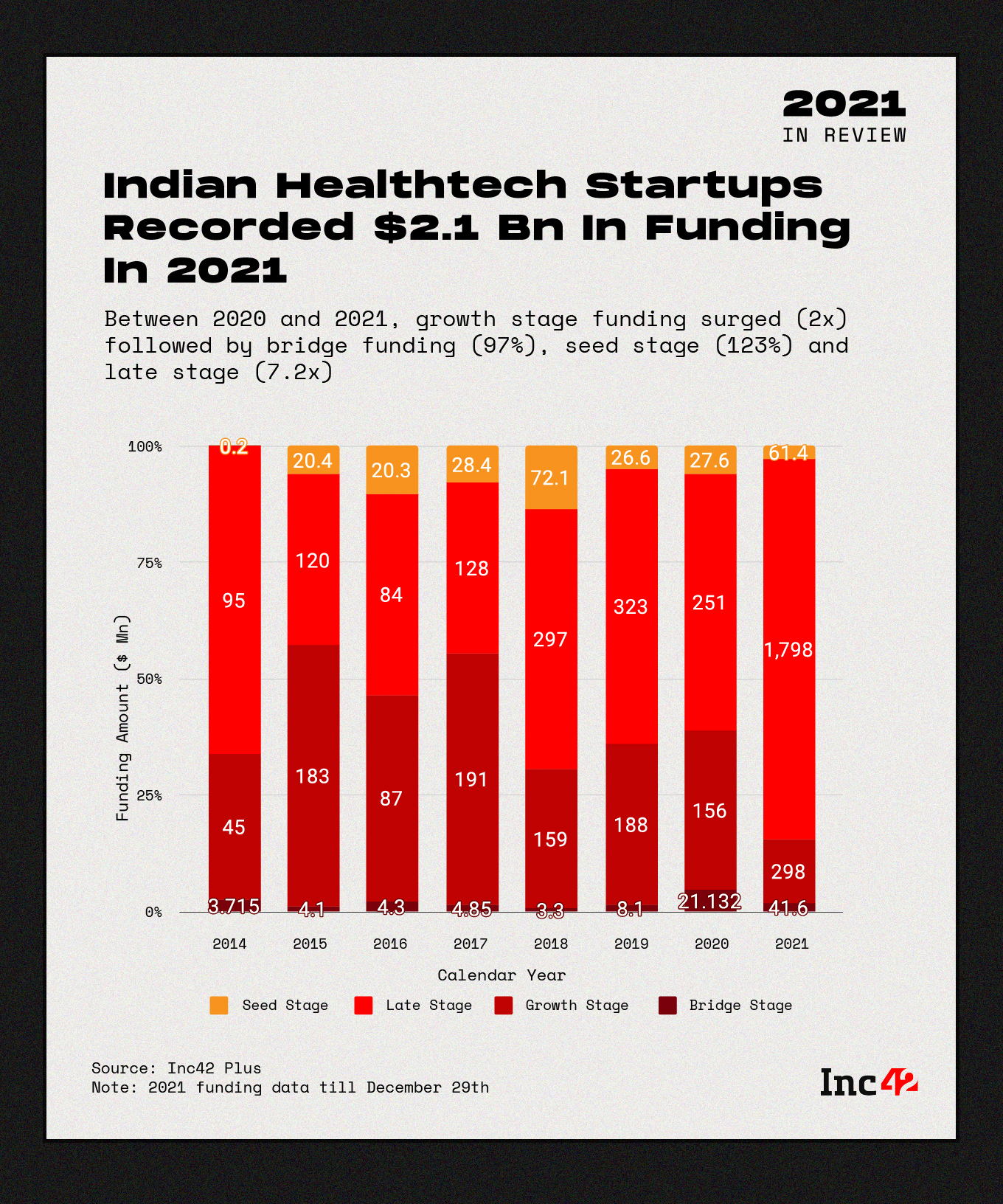
Healthtech is, of course, a recession-proof sector, said Natarajan, adding that it was not considered a hot investment destination by venture capitalists till a few years ago. “Who would have thought of a Serum Institute or Bharat Biotech,” he wondered.
The gestation period is long and by the nature of the business, the whole cycle is longer. But healthtech always got a look-in when the going was tough in the IT sector. The pandemic, however, changed all that perception and there were 3,548 active startups in the healthtech space in 2021, accounting for 8.9% of the startup world that comprises 39,960 companies.
Healthtech Startups Sprout As Focus Shifts To Battling Covid
As battling Covid became the top-most priority, a slew of blockchain startups came up with novel methods for tracing and testing that were pivotal in the battle against the pandemic. Quillhash, Hipla, Aiisma, Tagbox, Yosync, MacAppStudio are a few to name. Founders of startups like Bounce, Vokal and Urban Company collaborated to create Quarantine app (Q-app) as well.
MFine launched MFine Pulse, an app-based SPO2 monitoring tool that enables users to track their blood oxygen levels using just a smartphone.
Startups such as 1mg, PharmEasy, MFine, Practo, Healthians and Portea at-home Covid-19 sample collection services for antibody, antigen and RT-PCR tests.
Portea extended Oxygen support and supplies cylinders and concentrators for patients who are recommended to have oxygen.
Navia Life Care offered video consultation, and the service is currently used by thousands of doctors across the country. The company has curated a panel of Covid-19 specialists for patients trying to find specialist doctors for treatment.
Navia, MFine and several other startups too offered similar suites of services.
Online Pharmacy Is The Leader By A Good Distance
Fitness & wellness and healthcare analytics figured among the top sub-sectors in 2021 but it was online pharmacy that saw the most action during the year. Online pharmacy cornered $726 Mn, or 33%, of the $2.2 Bn that the sector attracted in 2021.
Online pharmacy got a big boost in the aftermath of the pandemic which warranted observing social distancing and other norms. They made access to medicines easier in the tough times of Covid and became an instant hit among consumers. Quick home delivery and prescription validation from licensed pharmacists added to their reliability and credibility.
Healthcare analytics attracted $454 Mn (20.6%), followed by fitness and wellness at $422 Mn (19.2%). Medtech received $256 Mn in funding.
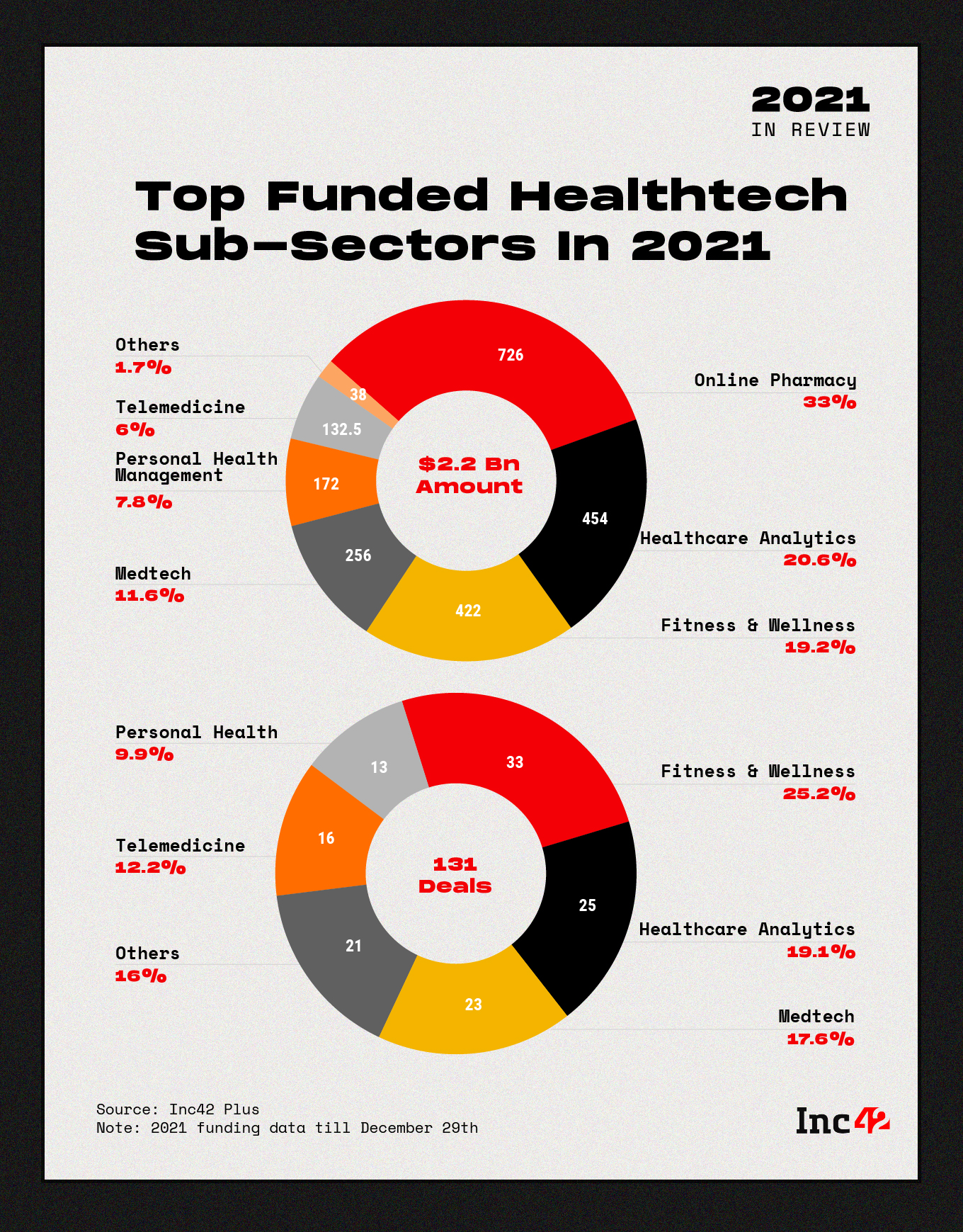
Natarajan while pointing out the emergence speciality investors in healthtech said mega funding would go to those in the services segment.
The challenge in medtech is the long gestation period – the long time for creation, testing and then validation.
Fitness and wellness accounted for the highest number of funding deals at 33. Healthcare analytics witnessed 25 deals, while Medtech closed 23 deals.
The fitness and wellness segment was buoyed as preventive healthcare is gaining further momentum. As more people are taking to yoga and gym, startups in this space are confident of a brighter future. “Pharmacy-health hybrid looks very savvy,” said Natarajan.
Telemedicine billed as the next big opportunity, however, recorded a lacklustre year. While it attracted $132.5 Mn in funding, the number of deals was high at 16, indicating small deal sizes. The relatively tepid show by telemedicine segment comes at a time when the government is projecting India as a global hub for healthcare services. The segment is forecast to touch $5.4 Bn by 2025.
Going forward a mix of telemedicine, pharma and generic would probably attract the big-ticket funding, Natarajan said.
Birth of 4 Unicorns In Healthtech Space in 2021
Helped by a surge in late-stage funding, four startups – Innovaccer, Pharmeasy, Curefit and Pristyn Care – became unicorns during the year. Late-stage funding rose 3.4x in 2021. As many as 17 had late-stage funding, which was a sharp rise from five deals in the previous year.
Innovaccer earned the distinction of first healthtech unicorn, but it took a relatively longer time frame of seven years for the startup to turn into a unicorn with a valuation of $1.9 Bn. While it took Pharmeasy ($1.5 Bn) six years, Pristyn Care surpassed the $1 Bn valuation mark ($1.3 Bn) in just three years. Curefit also took five years ($1.5 Bn).
Execution is the play and sustaining the momentum will be the key, Natarajan said, adding that it was of course a quick turnaround by Pristyn Care.
Sequoia, Tiger Global and B Capital Group were the prominent investors in the healthtech sector in 2021.
Speaking of acquisitions, of the 206 M&As in the startup world in 2021, the healthtech space accounted for only 13 of them. While ecommerce topping the list did not come as a surprise, the edtech sector beat the fintech segment with 31 deals against the latter’s 25.
Pharmeasy buying out Thyrocare for $600 Mn was the biggest acquisition in the sector. Tata Digital buying out 1mg for a reported $230 Mn was another high-profile acquisition during the year.
The Two Game-Changing Plans On The Anvil
Going forward, the government’s ambitious digital health mission and National Health Stack plans could end up as game-changers for startups in the healthtech sector. Increased health consciousness in the aftermath of Covid-19 is another factor that favours healthtech startups.
A robust IT framework for healthcare, big data and digital aggregation of medical records under national health stack and digital health mission are just what the doctor has ordered for the healthtech startups to flourish.
Explore Inc42's 2021 In Review




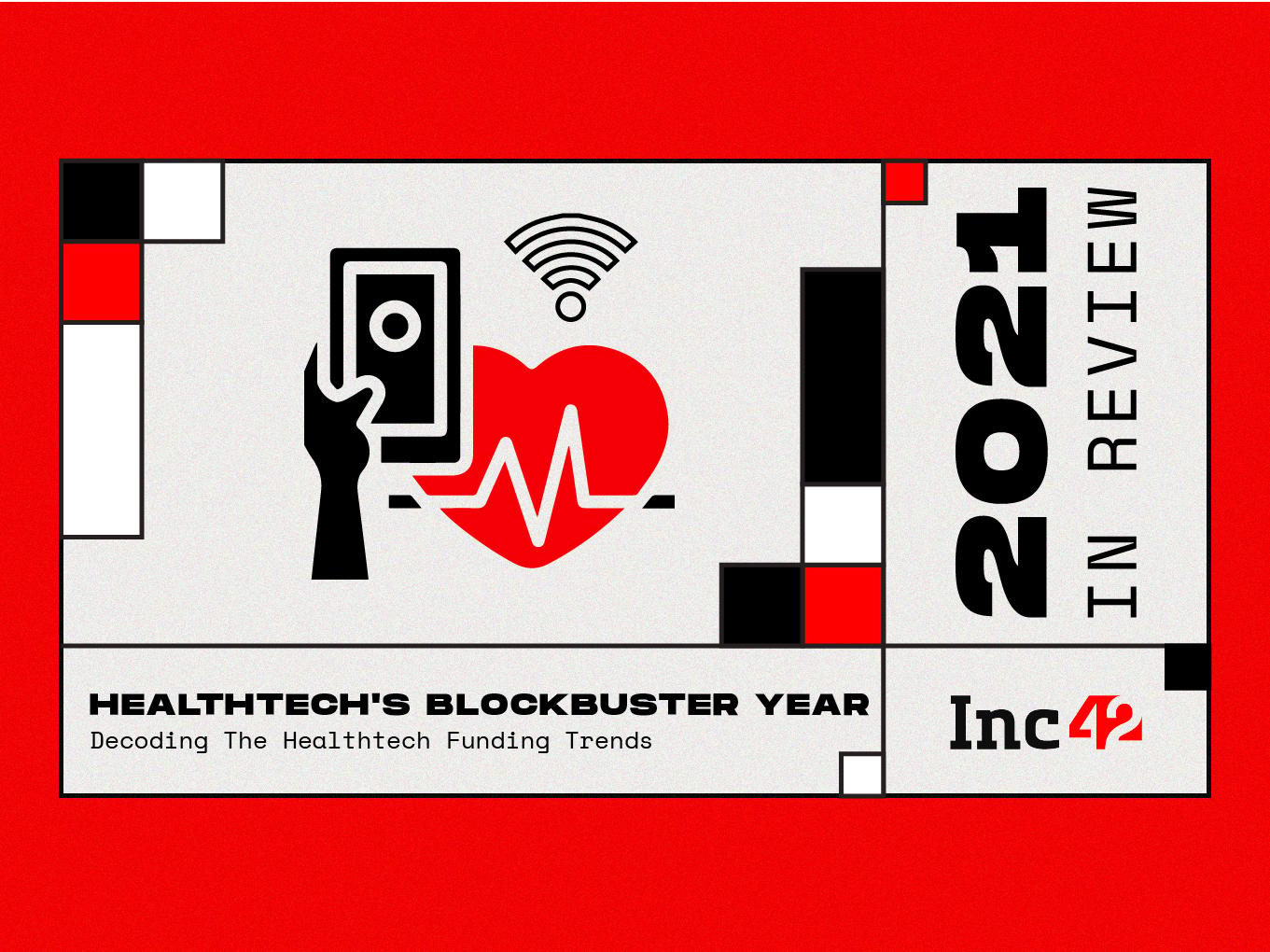





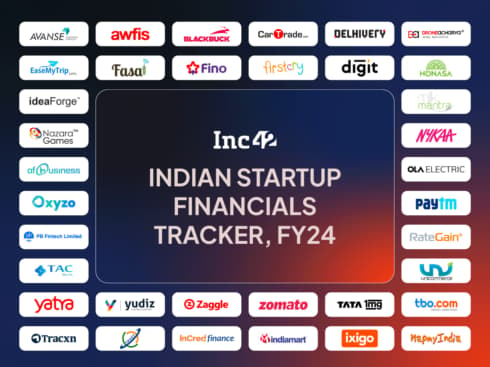
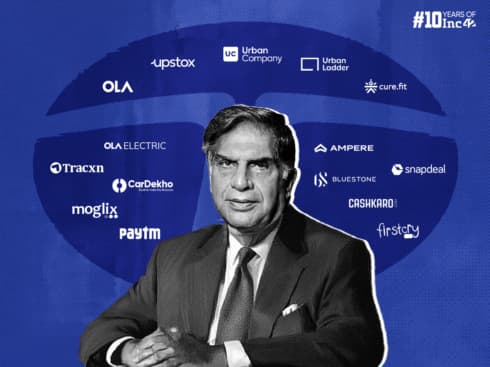




















 Ad-lite browsing experience
Ad-lite browsing experience